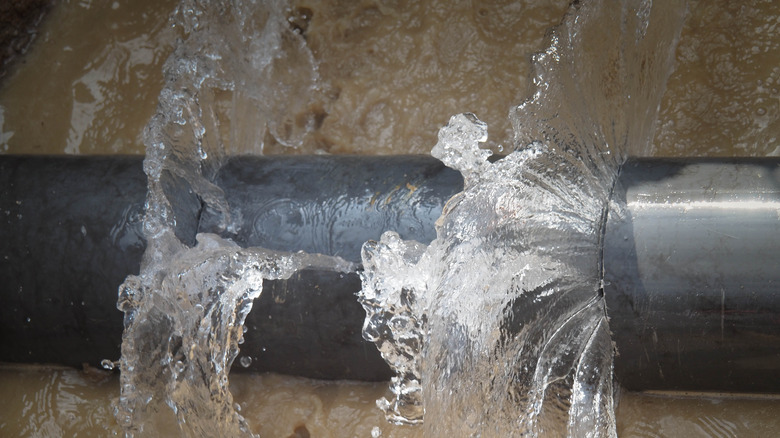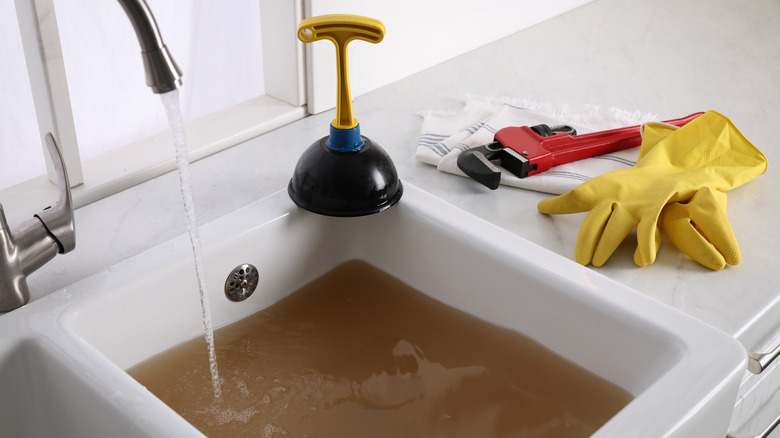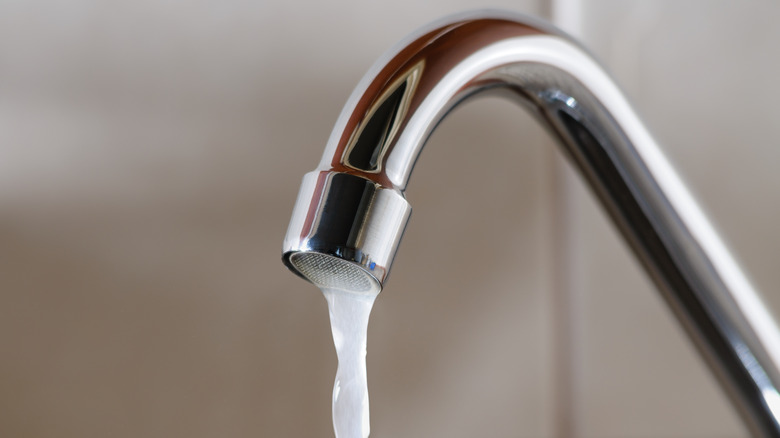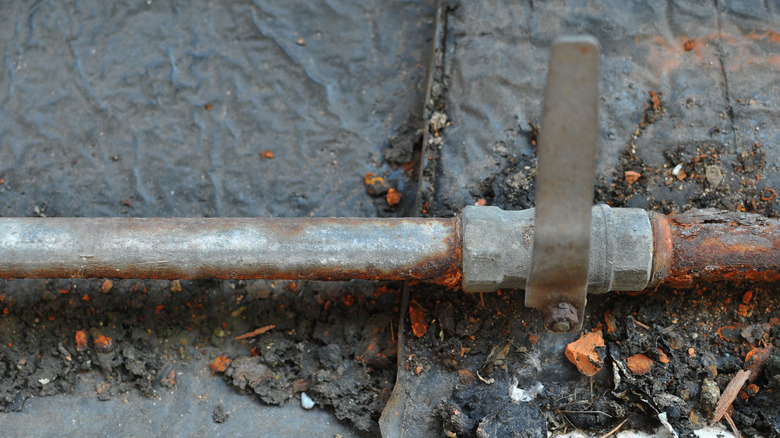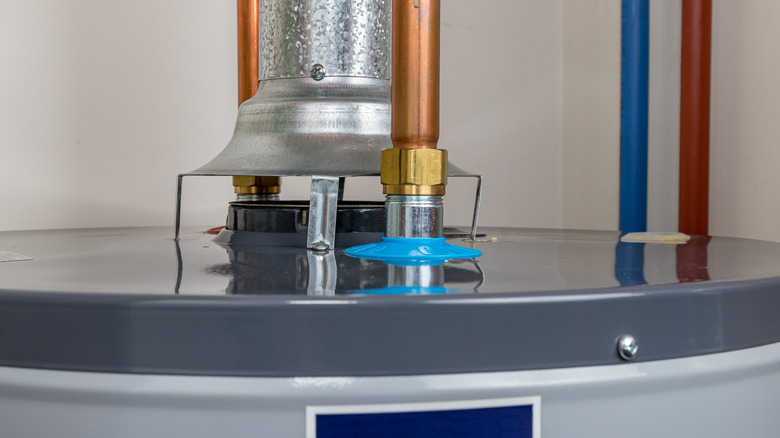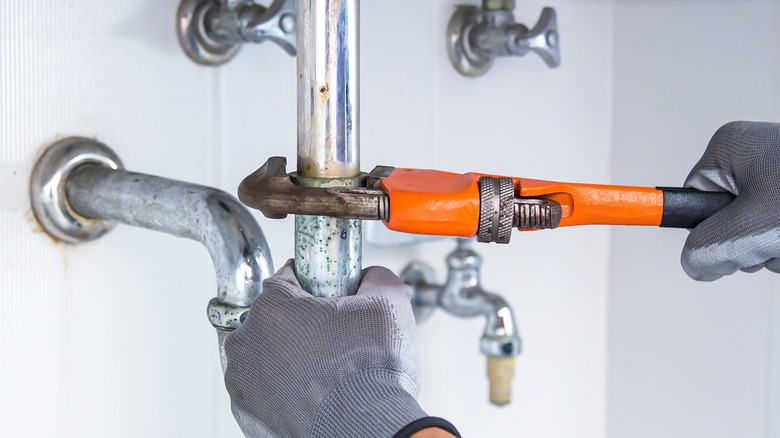An Expert Reveals When It's Time To Replace Your Plumbing - Exclusive
When it's working as it should, plumbing isn't something we think about too much. The "uh-oh" comes when there's an annoying sound or smell we can't quite figure out, and it's easy to put off a repair that seems like a slight inconvenience. The trouble is that neglecting a small problem today can lead to a costly repair later. If you're a homeowner or about to become one, you know that when it comes to plumbing, there are minor upgrades and issues like changing a showerhead or fixing a drippy faucet. But there are bigger plumbing problems, such as a broken pipe or clogged drain, and there are complete plumbing overhauls.
It might be tempting to fiddle around with repairs to save money or prove your DIY know-how. Still, unless you truly have the proper knowledge and skills, most repairs should be left to a professional plumber like the certified and insured team at John the Plumber in Ottawa, ON. In an exclusive interview with House Digest, Jake Romano, manager of John the Plumber, shares five tips to help homeowners (and soon-to-be-homeowners) discern the urgency of the plumbing problem they're experiencing.
You're dealing with clogs frequently
We use water in everyday activities without thinking about where it goes once it slips down the drain. A home's waste eventually finds its way to the sewer lateral, the pipe connecting the house to the city's main sewer line. Jake Romano says, "If your drain system is frequently clogging, this can be a sign that your sewer lateral needs to be replaced." Romano continued, "Frequent clogging often indicates a collapsed, cracked, or a broken sewer pipe, and it often means tree roots are growing inside the pipe." The latter is particularly true of yards with large, old trees with extended root systems.
In addition to severely clogged drains, other visible signs of sewer lateral problems will begin showing up over time. Look for cracks in the home's foundation, mold growth on walls, gurgling toilets, yard waste (in case of a septic tank rather than a city sewer hookup), sinking sidewalks or driveways, and insect or rodent infestations. All of these can indicate an acute sewer line failure. If left unrepaired, this plumbing problem can lead to thousands of dollars in damage; diagnosis of the core issue is better left to a professional.
Your water pressure is impacted
Jake Romano says, "A noticeable drop in your water pressure can also indicate that a major plumbing repair or replacement is needed. A drop in your water pressure can indicate many things, such as leaks, buildups, and blockages." A standard home's inlet water pressure ranges between 40 and 45 pounds per square inch (psi), but if water comes out of the taps with less force, it has dipped below this level. If you suspect this is the case, you can buy a pressure gauge to test it.
Some older homes still have galvanized steel pipes that eventually succumb to corrosion. Old steel pipes are insidious in that internal corrosion builds up silently over the years, severely restricting water flow. In this situation, the only real solution is to re-pipe the entire house. Another common culprit of diminished water pressure is mineral buildup from hard water. A plumber can diagnose the problem and flush the lines to restore water flow to its full capacity. It is recommended that homes with hard water have a water softener installed to reduce or eliminate some of the hardness, which can also lengthen the life of water-based appliances and lower mineral deposits in pipes.
You have lead pipes
John the Plumber's Jake Romano recommends replacing lead pipes with better options — "Lead pipes in your water system should be swapped out. First of all, metal pipes don't have nearly the same lifespan as plastic." Pipes, plumbing fixtures, and solder made with lead were common before 1986 and are a real problem in older cities and homes, according to the Environmental Protection Agency (EPA). Lead in plumbing isn't the only exposure threat, but it's a primary cause. Although bathing in water containing lead does not appear to pose risks since the metal isn't absorbed through the skin, ingesting the water can direct to severe developmental and health issues, especially in children and fetuses, says the EPA.
Lead dissolved in water is invisible, tasteless, and odorless. It is a cumulative toxin, which means it stays in the body and builds up over time; therefore, exposure –- even for a short duration -– is dangerous. A simple finger poke test performed by a doctor or health department official can determine if you have accumulated lead in your body. And the only way to know if your drinking water contains harmful amounts of lead is to have it tested, says Water Filter Guru. Romano declares the final word on the matter, "But more important is that lead pipes are toxic."
You hear unusual sounds and see discoloration
Is your plumbing emitting odd sounds? Jake Romano notes, "One of the best indicators that something is wrong with your plumbing is unusual sounds. Plumbing systems aren't necessarily quiet, but we generally know what they should and shouldn't sound like." The plumbing expert continues, "But if you start hearing banging, hissing, gurgling, or some other strange sounds when using plumbing, you should call a plumber."
These noises can be caused by various things, such as loose pipes, blockages, high water pressure, and thermal expansion. A licensed and insured plumber can diagnose the cause of the strange sounds. Sometimes the issue is the hot water tank. According to Romano, "Hot water tanks should last around 10 years. However, if your water heater is making strange noises or your hot water is coming out rust-colored, you may need to consider replacing the tank." But that's not all; the manager of John the Plumber adds, "Also, a leaking water tank is a pretty clear indicator that you likely need to replace the unit."
You smell unpleasant odors
Unpleasant odors could potentially be related to plumbing issues. Per Jake Romano, "Another important thing to pay attention to is unpleasant smells. Sewer smells or musty odors may not mean anything, but they sometimes mean that your pipes are damaged somewhere." If the stinkiness emanates from a drain, it can mean that the P-trap (the curved section of pipe leading out from under the sink) is dried out. Or perhaps, mold may be present in the home, the air vents are blocked, or the garbage disposal needs cleaning.
To find the problem, Romano says, "A plumber may need to do a smoke test on your drain system to locate a broken drain pipe so they can replace it." The smoke is nontoxic, can cover large areas of piping, and is excellent to use on hard-to-reach lines. To detect cracks, leaks, or other defects in residential plumbing, artificial smoke is pushed through pipes, and once the weakness is found, the damage can be repaired. If you're buying a house, hire a licensed plumber or certified home inspector to check all the plumbing thoroughly. It could save your pocketbook thousands of dollars in the long run.
